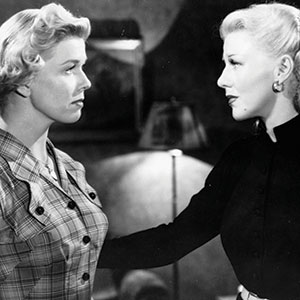Movies
Doris Day Festival at
Stanford Theatre
 The KKK takes Doris Day away in 'Storm Warning,' one of many Day films playing at the Stanford Theatre this month.
The KKK takes Doris Day away in 'Storm Warning,' one of many Day films playing at the Stanford Theatre this month.Doris Day is far more interesting than many of her movies would suggest. She became a byword for sweetness and purity—thus Groucho Marx's famous put down, "I knew Doris Day before she was a virgin." If you can't slut-shame 'em, shame 'em for being wholesome.
In his autobiography Day's sometimes-costar James Cagney noted, "After Love Me or Leave Me, Doris went into those Pillow Talk things, and I for one have always considered that a hell of a waste." Day made big money in froth: Tea for Two (May 1-2) is No No Nanette under a different cover; Move Over, Darling (with James Garner, May 17-19) is a remake of My Favorite Wife, and My Dream is Yours (May 8-9) is highly sticky, despite a guest-starring Bugs Bunny. But Day has a range that defies the predictability of her early 1960s hit-making days, as seen in the Stanford Theatre's well-programmed retrospective. More than a few, such as The Pajama Game, are unavailable for streaming.
The 1951 noir, Storm Warning (May 3-5), takes on the Ku Klux Klan with kid gloves. The third-billed Day is Lucy, an innocent in some neon-lit Pottersville (it was filmed in Corona, Calif.); her sister, Marsha (Ginger Rogers), comes for a visit, and witnesses a shooting by a lynch mob. Lucy's husband, a lout named Hank (Steve Cochran, pretty damned bad) was one of the killers; to silence Marsha, he goes all Stanley Kowalski on this newly arrived sister-in-law. Ronald Reagan, in a most imposing fedora, is a county investigator who can never quite nail the culprits. The leader of the gang tries to apologize—"It was an accident! We're all sorry about it!"—which certainly sounds like the Klan we all know and love. Yet Day's Lucy shows a lot of spine dealing with her creep of a husband. One likes the idea of Ginger Rogers playing Day's older sister, just as one could imagine Day being Meg Ryan's older sister.
It's double-billed with Love Me or Leave Me (1955), which could be charted as the beginning of a Day speciality: playing women mistaken for pushovers. Day is the 1920s singer Ruth Etting, whose career was facilitated by a shady Chicagoan named "Gimp" Snyder. As played by James Cagney, Snyder is as a garrulous dynamo who wheedles and neggs Ruth into marriage. She wearily confronts him on the morning after, as Snyder tells her of all the plans he has for her: "You don't have to sell me, I'm sold."
Cagney ensures you won't take your eyes off of him in every scene—a proto-Scorsese gangster who insists on the classiness of his joints, but is still coarse enough to rub his aching foot in public.
In his autobiography, Cagney celebrated Day's "unshrewd" qualities—"wide open as a barn door." he wrote. The light-footed, swan-necked actress can bring on the force like Judy Garland. "You gotta give her credit, the girl can sing,"says Snyder of Ruth. And in Love Me or Leave Me, Day has the benefit of a first-rate songbook, which includes "Mean to Me" and "You Made Me Love You." The choreography—emphasizing mid-century brashness and blare—is proto-Bob Fosse, getting Day ready for her later Fosse-choreographed smash The Pajama Game (double billed with Calamity Jane, May 10-12).
The 1953 Calamity Jane is something more than just a movie meant to be forever confused with Annie Get Your Gun. Day is in the title role in the well-worn buckskins. One wishes some dead-eyed gunslinger had shot the rhyming dictionary out of lyricist Paul Francis Webster's hand. However, it deserves a rep for its ahead-of-its-time approach to cross-dressing; there's a drag act at a Deadwood cabaret, Howard Keel's beardless Wild Bill Hickcock has to masquerade as a Sioux woman after losing a bet, and the trousered Calamity gets a big wink from a passing woman on the streets of Chicago. Later comes the friendship between Calamity and a singer (Allyn McLerie) she escorts back to Deadwood; they live together in a cabin during the number, "A Woman's Touch." Even the Oscar-winning showstopper Day performs, "Secret Love," might have been a coded message to gay people lost in 1950s America.
Doris Day Film Festival
Thru May 23
Stanford Theatre, Palo Alto
stanfordtheatre.org


